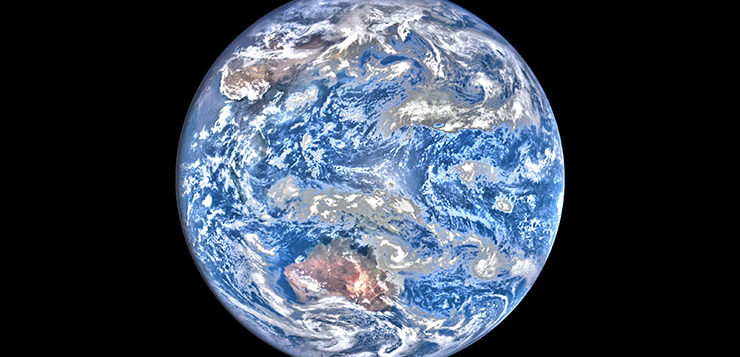The challenges facing humanity are not only massive, but they’re growing, writes Dr David Shearman, an Emeritus Professor of Medicine at the University of Adelaide, South Australia and an adviser to the United Nations’ Intergovernmental Panel on Climate Change (IPCC). And he fears the Australian government is doing too little, too late to confront the challenges.
In a recent Guardian article, 380 top climate scientists were asked what they felt about the future. They indicated they were terrified, but determined to keep fighting.
Seventy-seven per cent of the scientists believe global temperatures will reach at least 2.5C above pre-industrial levels, a devastating amount of heating; almost half, 42%, think it will be more than 3C; only 6% think the 1.5C limit will be achieved.
These scientists have enormous ability and dedication, yet like most news items in a distracted world, its effect was probably transient. The story was competing for attention with dangerous wars, international disagreements, rising levels of poverty and cost of living grievances in most countries, with surges of ill health due to more infections and mental illness.

One despairs that those carrying the democratic banner are failing to address this huge threat through their lack of knowledge and ability.
By now your despair may have deepened, you may stop reading this article because you have already done all you can personally to reduce your emissions, while at the same time governments promote and subsidise a future gas strategy, and ongoing coal mining. This mining causes 15 per cent of Australia’s domestic emissions from sending fossil fuels overseas.
In addition, as a wealthy, developed nation we should be ashamed of the considerable damage to poorer nations from our exported gas which enhances climate change causing thousands of deaths – a fact never mentioned by our governments. But shame aside, where does this leave us?
Our health system of biodiversity and ecological services
Climate change is wedded to an equally threatened partner, Australia’s natural environment, which is degrading more rapidly than many other developed countries, with little being done to stop it. Additionally, it is much more difficult to measure its degree of loss than the rising temperature of the earth and emissions in the atmosphere.
The importance of biodiversity is explained to the Australian public by governments and most environmental organisations by using the loss of iconic species such as the koala and cockatoo without public or political understanding that they are but two of thousands, perhaps millions of species that work together to provide ecological services to us, and for themselves.

The continuing decline of the life support system of ecosystem services and biodiversity is a crisis needing urgent, collective action. At stake is food production and many other essential benefits for health and life itself.
In the words of an article by a group of eminent environmental scientists:
“We report three major and confronting environmental issues that have received little attention and require urgent action.
First, we review the evidence that future environmental conditions will be far more dangerous than currently believed. The scale of the threats to the biosphere and all its life-forms—including humanity—is so great that it is difficult to grasp for even well-informed experts.
Second, we ask what political or economic system, or leadership, is prepared to handle the predicted disasters, or even capable of such action.
Third, this dire situation places an extraordinary responsibility on scientists to speak out candidly and accurately when engaging with government, business, and the public. We especially draw attention to the lack of appreciation of the enormous challenges to creating a sustainable future. The added stresses to human health, wealth, and well-being will perversely diminish our political capacity to mitigate the erosion of ecosystem services on which society depends.
The science underlying these issues is strong, but awareness is weak. Without fully appreciating and broadcasting the scale of the problems and the enormity of the solutions required, society will fail to achieve even modest sustainability goals.”
The situation can be summarised; Australia consumes its natural resources at the rate of 4.5 Earths per year and there is little evidence that this will be reduced under present policies. To explain the crucial role of biodiversity in our survival, I will explain two of many examples.
Healthy soil is a vital life support system
Soil, our ecological life support system for food production, consists of bacteria, fungi, viruses, nematodes, mites, worms and insects. In fact, two thirds of thousands and perhaps millions of species on the planet form the soil, maintain its ecological structure and services.
Pollinators, birds, and some animals and insects are part of this ecological service to control pests and enhance productivity.
Soil is alive. If listening systems are placed in the soil, one can hear the constant cacophony of noise made by these creatures as they break down organic material to components which can be absorbed through the roots of growing plants.

Clearly soil needs to retain its health by receiving organic matter to break down to service the food needs of plants. But in much farming on our famously very poor, old and heavily weathered soils, fertiliser is given to maintain and increase crop yields.
The result is living soil deteriorates, and is more easily blown or washed away by the increasing extreme storms of climate change, and most importantly by high temperatures which kill many of the soil’s species.
Pesticides and herbicides also damage the structure of soil and together with nitrogen fertiliser they wash into rivers and groundwater to damage further ecosystems killing fish and many other species.
Our choice is to continue with current practices and lose our life support system – food – or accept scientific alternatives and subsidise farmers for lost productivity.
We must also be aware that nitrogen fertiliser releases nitrous oxide (N2O) which is also an extremely potent greenhouse gas, further reducing humanity’s chance of controlling emissions.
Each of us possesses an ecological system in our intestines, the bacteria and enzymes in our small intestine, which split apart ingested foods so the constituents can be absorbed into our body. This system is known as your microbiome.
Some patients with inflammatory bowel diseases resistant to conventional treatment can be treated successfully with a “poo-transplant” – the patient takes an oral dose of faecal material from a healthy patient to modify their disordered intestinal ecosystem. Similarly some soils lack ecological life because of overcropping and can only be restored by soil transplant when healthy soil is spread over dead soil.
Biodiversity and ecosystems reduce epidemics
The Medical Journal The Lancet indicates we are now witnessing widespread increases in the emergence, spread and re-emergence of infectious diseases in wildlife, domestic animals, plants, and people. Covid was just the beginning.
Currently the H5N1 strain of influenza is causing millions of deaths of birds, some in mammals and now in a human.
An important cause is natural habitat being increasingly lost and fragmented and the intact fragments are decreasing in size.

Changes in climate and natural habitat are shifting species distributions and rearranging the composition of ecological communities. An estimated 1 million species are at risk of extinction.
We are living cheek by jowl with organisms dependent on the remaining biodiversity. So how do we address these threats?
In 1946 the US Communicable Disease Center (CDC) opened with the role of preventing malaria from spreading across the United States. Its role today is to conduct critical science and provide health information that protects the US against expensive and dangerous health threats, and to respond when these arise.
The US CDC is currently preparing two bird flu vaccines for human use.
In 2023, an “Interim ACDC” – an ‘Australian Centre for Disease Control’ – was established by the Albanese Government, with initial funding of $90m over two years.
The CEO of the Public Health Association of Australia has said, “The budget for the ACDC needs to be in the hundreds, not tens of millions of dollars, and the legislation that creates it needs to ensure it can function effectively long into the future, including through periods when Executive Government does not prioritise public health.”
Since the beginning of 2022, 44 countries have experienced a 10-fold increase in the incidence of at least one of 13 infectious diseases compared with a pre-pandemic baseline.
There is much to be done by the fledgling ACDC. But our government is wallowing at sea, lacking knowledge and even willingness to think laterally to bring essential reforms to aid our survival. The endpoint for our current economy – economic growth forever, driven by consumption and population growth – indicates the government is at sea on a Titanic.
In the 1912 disaster the wealthy elite enjoyed the upper deck cabins, were first into the life boats and survived, but this time we will all go down together.
That is unless government steers the ship with the IPAT Equation: I = P x A x T.
The equation maintains that impacts on ecosystems (I) are the product of the population size (P), affluence (A), and technology (T) of the human population in question.
Donate To New Matilda
New Matilda is a small, independent media outlet. We survive through reader contributions, and never losing a lawsuit. If you got something from this article, giving something back helps us to continue speaking truth to power. Every little bit counts.




